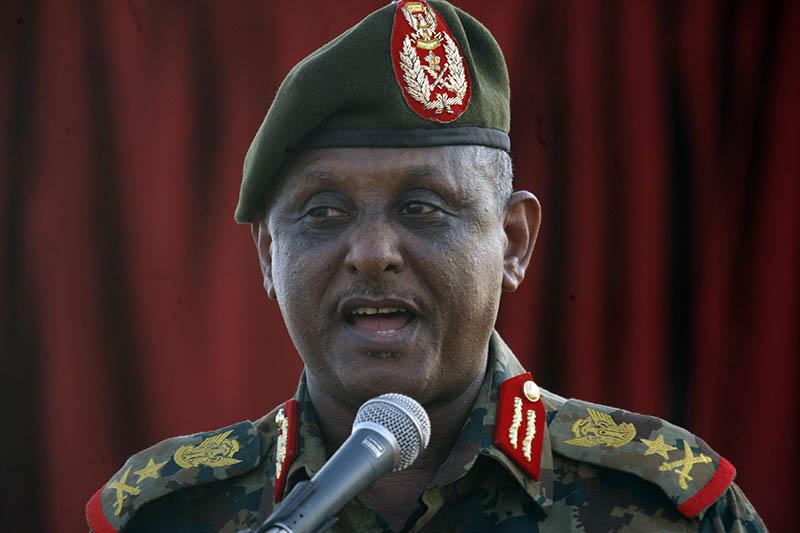Sudan accusations now rattle relations with Chad

The Deputy Commander-in-Chief of the Sudan Armed Forces (SAF), Lt Gen Yasir El Atta (File photo: SUNA)
Tensions escalate in Sudan’s diplomatic landscape as accusations of collaboration with the Rapid Support Forces (RSF) not only have strained relations with the United Arab Emirates (UAE) but now also with Chad, raising concerns about a broader regional fallout.
Sudan earlier this week rejected Chad’s request for an apology, following accusations made by Lt Gen Yasir El Atta, the deputy commander of the Sudan Armed Forces (SAF), directed at N’Djamena in late November.
Speaking from the Wadi Sedna military base in Omdurman on November 29, El Atta pointed fingers at “powerful, bribed politicians who accommodate Emirati planes supplying the RSF with necessary resources through multiple airports”.
The implicated airports allegedly include Entebbe Airport in Uganda, an airport in the Central African Republic, and the Amdjarass and N’Djamena airports in Chad.
In response to the accusations, Chad recalled its ambassador in Sudan and issued a three-day ultimatum for an apology, warning it would “take whatever measures deemed appropriate” should the Sudanese government refuse to comply.
Dismissing Chad’s request, acting Foreign Affairs Minister Ali El Sadig asserted that Khartoum would not apologise for the accusations against the RSF, claiming that Sudan “provided Chad with evidence, including images, demonstrating the logistical support provided -via the UAE- to the RSF.
“We will not apologise. Our accusations did not come out of nowhere,” he said.
Emirates
The UAE for its part swiftly reacted to El Atta’s accusations last week by expelling three Sudanese diplomats, including the ambassador.
On Monday, the Sudanese FM Ministry informed the UAE Embassy in Port Sudan of the government’s decision to declare Emirati 15 diplomats as persona non grata and demanded that they leave the country within 48 hours.
Radio Dabanga reported earlier this week about the worries of Sudanese living and working in the UAE should the relationship between the two countries deteriorate for the worse.
Sudanese political circles are also expecting a response from the Ugandan government, which was implicated by Lt Gen El Atta as well.
‘Blatant disregard’
Retd Ambassador Adel Sharafi commented on the diplomatic row unfolding between Sudan and Chad by saying that “such crises are to be anticipated when Sudan is governed by a military and Islamist regime.” He cited the deterioration of relations with neighbouring countries “including Egypt” during the rule of ousted president Omar Al Bashir.
“The current regime shows a blatant disregard for Sudan’s interests and relations with neighbouring countries, mirroring its indifference to the well-being of the nation and its people”, the senior diplomat said in an interview with Radio Dabanga on the subject.
Concerning FM Minister El Sadig’s refusal to apologise for Lt Gen El Atta’s statements, Sharafi predicted potential negative consequences for Sudan’s relations with Chad, which, he said, plays an unique role in the region “particularly in Darfur”.
Chad hosts a significant number of Darfuri refugees, in camps in the eastern part of the country. According to the UN Office for Coordination of Humanitarian Affairs (OCHA), almost 40 per cent of the Sudanese refugees, approximately 549,000 people, fled to Chad.
According to Sharafi, Chad’s Amdjarass Airport in eastern Chad plays a crucial role in receiving humanitarian aid for Sudanese refugees. “A field hospital, funded by the UAE, was built on the grounds of Amdjarass Airport. The UAE initially offered to build it in Sudan but, upon the refusal of the Sudanese government, it was shipped to Chad, where it serves as a substantial medical facility.”
To address the situation, the diplomat suggested a measured response, falling between an apology and a rejection. “This could involve a statement from the FA Ministry clarifying that El Atta’s remarks were taken out of context or misunderstood, allowing for the preservation of the relationship between the two countries.”
While acknowledging the potential negative impact of strained relations with Chad on the Sudanese government, he expressed optimism that N’Djamena’s behaviour towards Sudanese refugees in Chadian camps will remain unaffected.
Kampala
In response to anticipation for a Ugandan response, Sharafi believes there will be potential repercussions on Sudanese-Ugandan relations as well, emphasising the typically “slower pace” of Ugandan diplomacy.
Following the Sudanese FM ministry’s statement on the outcomes of a special IGAD summit on Sudan held in Djibouti on Saturday, the ambassador expressed concern at the deterioration of relations with the IGAD Quartet (Kenya, South Sudan, Ethiopia, and Djibouti).
“IGAD made a substantial effort to organise the meeting in Djibouti under the leadership of member states’ leaders, and the summit was perceived as a potential breakthrough in resolving the crisis in Sudan. However, the ministry’s subsequent statement, disavowing the agreed-upon outcomes, conveyed a highly negative message to all IGAD countries and their supporters.”
“This negative message surpassed even Lt Gen El Atta’s statements towards neighbouring countries,” he said, predicting that such a stance will inevitably impact Sudan’s relations with all IGAD countries and “diminish prospects for peace, a ceasefire, and an end to hostilities”.











 and then
and then